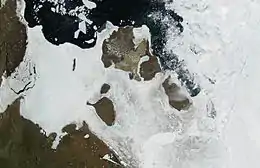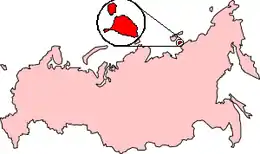 Aqua MODIS satellite image of the Lyakhovsky Islands | |
 | |
| Geography | |
|---|---|
| Location | Laptev Sea |
| Coordinates | 74°39′36″N 141°59′14″E / 74.66000°N 141.98722°E |
| Archipelago | Lyakhovsky Islands |
| Total islands | 6 |
| Administration | |
Russia | |
| Federal subject | Sakha Republic |
| Demographics | |
| Population | uninhabited |
The Lyakhovsky Islands (Russian: Ляховские острова, tr. Lyakhovskiye ostrova; Yakut: Ляхов арыылара) are the southernmost group of the New Siberian Islands in the Arctic seas of eastern Russia. The islands are named in honour of Ivan Lyakhov, who explored them in 1773.
Geography
They are separated from the mainland by the Laptev Strait (60 km (37 mi) wide), and from the Anzhu Islands group by the Sannikov Strait (50 km (31 mi) wide). Two islands dominate the group:
- Bolshoy Lyakhovsky Island (Great Lyakhovsky Island) 5,156.6 km2 (1,991.0 sq mi) with a maximum altitude of 311 m (1,020 ft) on Emy Tas[1]
- Maly Lyakhovsky Island (Little Lyakhovsky Island) 975.5 km2 (376.6 sq mi)[2]
- Stolbovoy is a large island detached from the group.
- Off Great Lyakhovsky Island's southwestern cape lies a small islet called Ostrov Khopto-Terer.
- Semyonovsky Island has now disappeared after heavy erosion. Before its disappearance, it was at 4 km2, one of the smallest islands in the archipelago.[3][4]
In popular culture
Part of the action of two novels by Jules Verne, Waif of the Cynthia (1885) and César Cascabel (1890), takes place there. In the latter, the term "Liakhov Islands" refers to the New Siberian group as a whole, as the principal action is on Kotelny Island.
References
- ↑ Bol. Lyakhovskiy (Liakhov)
- ↑ Mal. Lyakhovskiy (Lachovski)
- ↑ Grigorov, I.P., 1946, Disappearing islands. Priroda, pp. 58–65 (in Russian)
- ↑ Gavrilov, A.V., N.N. Romanovskii, V.E. Romanovsky, H.-W. Hubberten, and V. E. Tumskoy (2003). Reconstruction of Ice Complex Remnants on the Eastern Siberian Arctic Shelf. Permafrost and Periglacial Processes. vol. 14, pp. 187–198.
External links
 Media related to Lyakhovsky Islands at Wikimedia Commons
Media related to Lyakhovsky Islands at Wikimedia Commons
This article is issued from Wikipedia. The text is licensed under Creative Commons - Attribution - Sharealike. Additional terms may apply for the media files.